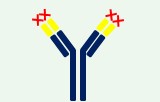
Antibodies
An antibody is a glycoprotein or immunoglobulin that binds to an antigen (or part of the antigen called an epitope), this combination makes it possible to induce an immunological reaction against an external agent. An antibody is composed of constant and variable domains. The variable domains constitute the site of binding to the antigen or paratope.
A distinction is made between monoclonal and polyclonal antibodies. Monoclonal antibodies recognize a single type of epitope on a given antigen whereas polyclonal antibodies are a mixture of antibodies recognizing different epitopes on a given antigen.
Antibodies are an important tool for the study and detection of many mechanisms and pathologies.
In addition to monoclonal and polyclonal antibodies, a distinction is also made between primary and secondary antibodies. These 2 types of antibodies are related to the techniques in which they are used. Indeed, the primary antibodies recognize the epitopes of the target protein while the secondary antibodies will bind to the primary antibodies in order to visualize the complex formed thanks to a coupling of the secondary antibodies with an enzyme (HRP or AP), a fluorochrome or biotin.




